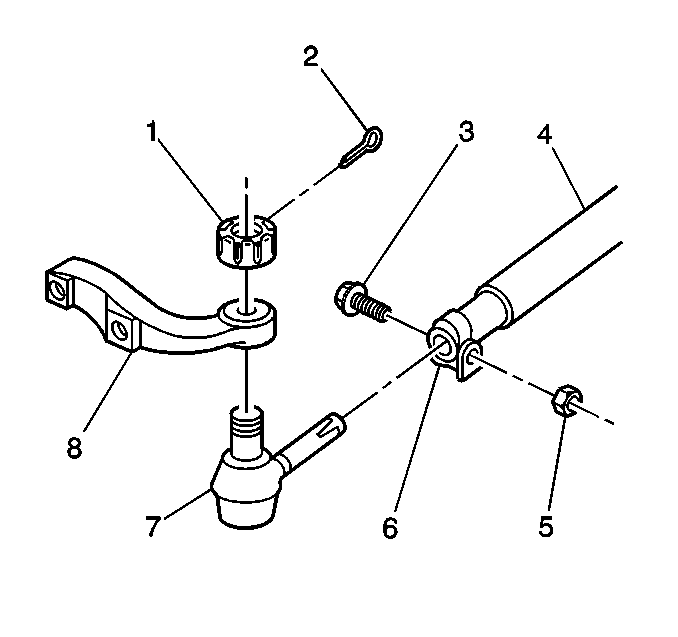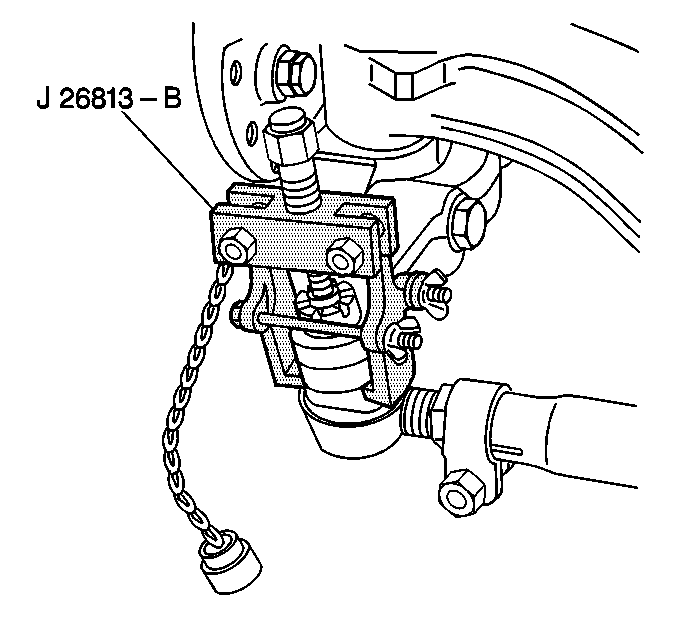Tools Required
J 26813-B Steering
Linkage Puller
Removal Procedure

Important: Note the following conditions before beginning repairs to the tie rod
assembly:
| • | The amount of threads visible on the tie rod |
| • | The position of the tie rod end clamps (6) |
| • | The direction from which the clamp bolts are installed |
| • | The tie rod adjuster tube components may be rusted. Apply penetrating
oil between the clamp and the tube. Rotate the clamps until the clamps move
freely. |
| • | Ensure that these parts are reinstalled in the proper position. |
- Remove the cotter pin (2) from the tie rod end ball joint (7).
- Discard the cotter pin (2).
- Remove the nut (1) from the tie rod ball joint (7).

- Use the J 26813-B
in order to remove the tie rod ball joint.

- Loosen the tie rod tube
clamp nut (5).
- Remove the tie rod assembly (7) from the tie rod tube (4).
- Inspect the following components for damage and corrosion:
| • | The tie rod end (4) threads |
| • | The ball stud (7) threads |
| • | The ball stud nut (1) threads |
- Inspect the ball stud taper for nicks and dirt.
Important: If the tube (4) is bent less than 5 degrees, cold straighten
the tube. If the tube is bent more than 5 degrees, replace the tube.
- Inspect the tie rod tube (4) for straitness.
- Clean the following compounds of dirt and rust:
Installation Procedure

Important: Thread the tie rod assembly into the tie rod tube with the same amount
of threads visible as noted prior to removal.
- Install the tie rod ball joint (7) into the tie rod tube (4).
- Install the tie rod ball joint (7) into the tie rod arm (8).
Notice: Use the correct fastener in the correct location. Replacement fasteners
must be the correct part number for that application. Fasteners requiring
replacement or fasteners requiring the use of thread locking compound or sealant
are identified in the service procedure. Do not use paints, lubricants, or
corrosion inhibitors on fasteners or fastener joint surfaces unless specified.
These coatings affect fastener torque and joint clamping force and may damage
the fastener. Use the correct tightening sequence and specifications when
installing fasteners in order to avoid damage to parts and systems.
- Install the ball
joint nut (1)
Tighten
| • | Tighten the ball joint nut in the axle assembly with a 3675 kg
(8,100 lb) rating to 130 N·m (95 lb ft). |
| • | Tighten the ball joint nut in all other axle assemblies to 160 N·m
(120 lb ft). |
| - | Advance the ball joint nut (1) to the nearest cotter pin
slot. |
| - | Do not back a ball joint nut off in order to insert a cotter pin. |
- Install the new cotter pin (2).
- Lubricate the tie rod ball with chassis lubricant. Refer to
Fluid and Lubricant Recommendations
in Maintenance
and Lubrication.
- Adjust the toe-in. Refer to
Front Toe Adjustment
in Wheel Alignment.
- Tighten the tie rod tube clamp bolt nuts (5).
Tighten
Tighten the tie rod tube clamp bolt nuts to 75 N·m (55 lb ft).




